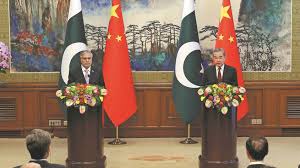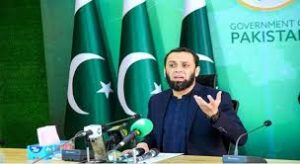CPEC: Pakistan, China hold JCC meeting, vow to move forward

Islamabad: Pakistan and China held the 13th Joint Cooperation Committee (JCC) meeting on the China Pakistan Economic Corridor (CPEC) and vowed to move forward.
Pakistani Federal Minister for Planning, Development, and Special Initiatives Ahsan Iqbal and minister and Vice Chairman National Development and Reform Commission (NDRC) Li Chunlin jointly chaired the 13th JCC meeting.
At the beginning of the meeting, Li Chunlin praised the Pakistani minister of planning for his deep commitment to CPEC and his active role in promoting it.
Ahsan Iqbal chaired 10 of the 13th JCC meetings held so far, which is quite an honour in itself, mentioned Li Chenlin.
In the JCC meeting, the Pakistan side appreciated the vision of Chinese leadership to upgrade the second phase of CPEC with the inclusion of these new corridors which are in harmony with Pakistan’s 5E framework.
In his speech Ahsan Iqbal said that the CPEC had become a transformative force in the region as the flagship project of the Belt and Road Initiative (BRI), especially for Pakistan.
The minister said that CPEC will enhance cooperation and development for both countries in the fields of agriculture, industry, information technology and science.
Federal Minister for Privatization, Minister of Communications, Federal Minister of Information Technology, Secretary Planning, Secretary Energy, Secretary Communications, Secretary Board of Investment, and senior officials of federal and provincial ministries participated in the meeting.
Ahsan Iqbal said, “We are ready to work with NDRC to finalise the scope and implementation plan on these corridors. Both sides are highly committed to this shared vision, and together, both countries have embarked on a journey of shared dreams, working hand in hand to build high-quality development projects.”
Last year, Pakistan and China celebrated a decade of successful high-quality development and ever closer collaboration under CPEC, he added.
The minister stated that during the celebrations, Vice Premier He Lifeng unveiled five new corridors proposed by President Xi Jinping, including the Growth Corridor, Livelihood Enhancing Corridor, Innovation Corridor, Green Corridor, and Opening Up/Regional Connectivity Corridor.
Ahsan Iqbal contended that Gwadar Port had been made operational and several infrastructure and social sector projects have been completed. He said that these developments are pivotal in the transformation of Gwadar into a smart port city, promising to significantly improve the lives and livelihoods of the people of Gwadar and its adjoining coastal areas.
“As we shift our focus from government-to-government (G2G) to business-to-business (B2B) cooperation in the next phase of CPEC, we emphasize high-quality development in industrialization, agriculture, and science and information technologies,” he said.
Ahsan Iqbal stressed that “now is the time to attract investors and manufacturers to populate the Special Economic Zones, develop the Gwadar as a business district, and create high-quality tourist resorts in Gwadar.To this end, we propose signing of an MoU to promote cooperation in these areas.”
He said the second phase of CPEC has begun, but much work remains to ensure its success. “We are progressing on developing four priority SEZs, including Rashakai SEZ, Allama Iqbal Industrial City, Dhabeji SEZ, and Bostan SEZ. However, we need to replicate the Chinese experience in this area”, he maintained.
He said, “to set up our SEZs similarly to Chinese SEZs, we require support from your technical experts to advise our SEZ authorities regularly and this can be facilitated under the Industrial Cooperation Framework Agreement recently signed by both sides”.
“We earnestly seek relocation of Chinese industries in these SEZs and Chinese companies can relocate their manufacturing units in these SEZs and take benefits from the cheaper labour force, high return on investment and easy and cheaper access to world markets. The government proposes to convene the Pakistan-China Business Forum in collaboration with NDRC for matchmaking between Pakistani and Chinese enterprises,” he said.
Ahsan Iqbal said that the steady progress CPEC has made since its inception in 2013 and in the energy sector, “we have successfully completed 16projects, with generation capacity of8,020 MW, along with two coal mines and a + 660 kV HVDC transmission line and the total investment in these projects is around USD 16 Billion. Currently, one hydropower project 884 MW Suki Kinari worth of USD 1.707 Billion is under construction expected to be commissioned by November 2024.”
He said that three power projects, including two hydel (Azad Pattan 700 MW and Kohala 1124 MW) and one coal based(Gwadar) are with generation capacity of 2124.7 MW worth USD 4.157 Billion are at the advance stage to achieve financial closing and we urge Chinese side for their support in achieving groundbreaking of these projects as soon as possible.
He underlined that in the transport infrastructure sector, eight (08) projects have been completed thus far at a cost of US$ 6.7 billion and several projects including roads, Airport (Gwadar) and Digital Media projects are well underway.
“We hope to see Gwadar Airport in service soon. CPEC has contributed in the construction of around 888 km of motorways and highways with both Chinese and local financing. Additionally, another 853 km are currently under construction through local financing.”
He informed that China and Pakistan have made significant progress on the Pakistan Railways Mainline-1 project and the re-modified PC-1 has been approved with a cost of USD 6.76 billion in two phases.
The minister said that agriculture cooperation is a crucial element of the second phase of CPEC.
He said both sides have signed multiple agreements and protocols to promote the export of Pakistan’s agricultural commodities to China.
Another area of interest already included in CPEC is mining and “I hope that the establishment of a sub-group for Mining, agreed under the JWG on Industrial Cooperation will help us initiate cooperation in this area. Considering the scope and potential of cooperation in the mines and minerals sector, we propose the establishment of a separate Joint Working Group to be led by the Petroleum Division from the Pakistan side.”





